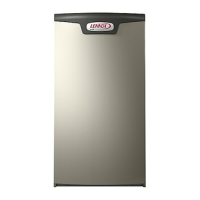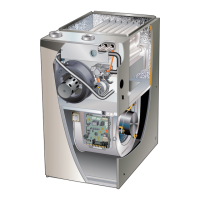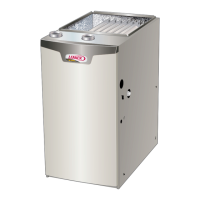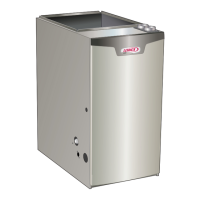Page 62
4 - Move gas valve switch to OFF.
5 - Replace the access panel.
Failure To Operate
If the unit fails to operate, check the following:
1 - Is the thermostat calling for heat?
2 - Are access panels securely in place?
3 - Is the main disconnect switch closed?
4 - Is there a blown fuse or tripped breaker?
5 -
6 - Is gas turned on at the meter?
7 -
8 -
9 - Is the unit ignition system in lockout? If the unit
locks out again, inspect the unit for blockages.
Heating Sequence Of Operation
1 - When thermostat calls for heat, combustion air
inducer starts.
2 - Combustion air pressure switch proves blower
operation. Switch is factory set and requires no
adjustment.
3 - After a 15-second prepurge, the hot surface ignitor
energizes.
4 - After a 20-second ignitor warm-up period, the gas
valve solenoid opens. A 4-second trial for ignition
period begins.”
5 -
the combustion process continues.
6 -
the ignition control will repeat steps 3 and 4 four
more times before locking out the gas valve
control will then automatically repeat steps 1 through
6 after 60 minutes. To interrupt the 60-minute
“WATCHGUARD” period, move thermostat from
“Heat” to “OFF” then back to “Heat”. Heating
sequence then restarts at step 1.
Gas Pressure Adjustment
Gas Flow (Approximate)
TABLE 19
GAS METER CLOCKING CHART
EL297
Unit
Seconds for One Revolution
Natural LP
1 cu ft
Dial
2 cu ft
Dial
1 cu ft
Dial
2 cu ft
Dial
-045 80 160 200 400
-070 55 110 136 272
-090 41 82 102 204
-110 33 66 82 164
-135 27 54 68 136
Natural-1000 btu/cu ft LP-2500 btu/cu ft
Furnace should operate at least 5 minutes before check-
-
tions of gas through the meter. (Two revolutions assures
a more accurate time.) Divide by two and compare to time
in TABLE 19. If manifold pressure matches TABLE 21 and
restriction. Remove temporary gas meter if installed.
NOTE - To obtain accurate reading, shut o all other gas
appliances connected to meter.
Supply Pressure Measurement
An inlet post located on the gas valve provides access
to the supply pressure. See Figure 66. Back out the 3/32
hex screw one turn, connect a piece of 5/16 tubing and
connect to a manometer to measure supply pressure. See
TABLE 21 for supply line pressure.
On multiple unit installations, each unit should be checked
separately, with and without units operating. Supply pres-
sure must fall within range listed in TABLE 21.
Manifold Pressure Measurement
NOTE - Pressure test adapter kit (10L34) is available from
Lennox to facilitate manifold pressure measurement.
A manifold pressure post located on the gas valve pro-
vides access to the manifold pressure. See Figure 66.
Back out the 3/32 hex screw one turn, connect a piece
of 5/16 tubing and connect to a manometer to measure
manifold pressure.
pressure between the positive gas manifold and the neg-
ative burner box must be considered.
1 - Connect the test gauge positive side “+“ to manifold
pressure tap on gas valve as noted above.
2 - Tee into the gas valve regulator vent hose and
connect to test gauge negative “-”.
3 -
allow for steady state conditions.
4 - After allowing unit to stabilize for 5 minutes, record
manifold pressure and compare to value given in
TABLE 21.
5 - If necessary, make adjustments. Figure 62 shows
6 -
TABLE 21.
7 -
an accurate reading has been obtained. Turn the
supply and manifold 3/32” hex screws one revolution
back into the gas valve.
8 - Start unit and perform leak check. Seal leaks if
found.

